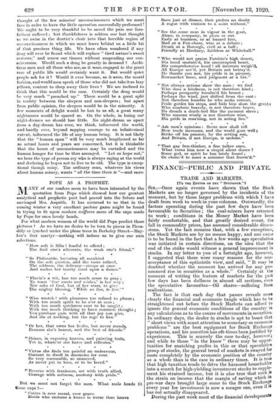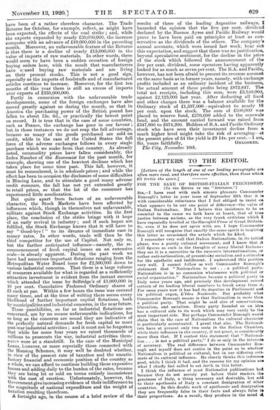FINANCE—PUBLIC AND PRIVATE,
TRADE AND MARKETS.
ET° THE EDITOR Or THE " SPECTATOB."1
Sie,—Once again events have shown that the Stock Markets are no longer governed by the incidents of the moment, but by those larger problems with which I have dealt from week to week in your columns. Outwardly, the factors operating during the pest few days have been favourable to Securities ; the coal-miners have returned to work ; conditions in the Money Market have been fairly comfortable, and that greatly desired event, the fall in commodity prices, has assumed considerable dimen- sions. Yet the fact remains that, with a few exceptions, the Stock Markets are by no means happy, and one cause is to be found in the fact that a few weeks ago speculation was initiated in certain directions, on the idea that the end of the strike would witness a general improvement in stocks. In my letter to you of a fortnight ago, however, I suggested that there were many reasons for the non- acceptance of this optimistic view, and said, "It may be doubted whether the moment has arrived for any pro- nounced rise in securities as a whole." Certainly at the moment of writing the feature of markets for the past few days has been dullness in almost all sections, even the speculative favourites—Oil shares—suffering from realizations.
The fact is that each day that passes reveals more clearly the financial and economic tangle which has to be straightened out before the Stock Markets can afford to ignore the general economic conditions of the country in any calculations as to the course of movements in securities. In ordinary days, the dealer in stocks is apt to boast that "short views with scant attention to monetary or economie problems" are the best equipment for Stock Exchange operations, and his assertion has oft-times been justified by experience. This is scarcely the case to-day, however; and while to those "in the know" there may be oppor- tunities for snatching profits in this or that speculative group of stocks, the general trend of markets is swayed far more completely by the economic position of the country as a whole than is the case in ordinary times. It is true that high taxation tends to drive the harassed householder into a search for high-yielding investment stocks to supple- ment his strained income, but it is also true that such iS the strain on income that the margin of saving which in pre-war days brought large sums to the Stock Exchange every year for investment is now a meagre one, even if it has not actually disappeared.
During the past week most of the financial developments
have been of a rather cheerless character. The Trade Returns for October, for example, reflect, as might have been expected, the effects of the coal strike ; and, while the exports expanded by nearly 130,000,000, the increase compares with an advance of £49,000,000 in the preceding month. Moreover, an unfavourable feature of the Returns is that there is a decline of nearly £13,000,000 in the value of imports of raw materials. In other words, there would seem to have been a sudden cessation of foreign buying orders here, with the result that manufacturers have c2ased buying raw materials and are living on their present stocks. This is not a good sign, especially as the imports of foodstuffs and of manufactured articles continue to increase. Moreover, for the first ten months of this year there is still an excess of imports over exports of £335,000,000.
Partly in connexion with the unfavourable trade developments, some of the foreign exchanges have also moved greatly against us during the month, Bo that in America the purchasing power of the British pound has fallen to about 13s. 6d., or practically the lowest point on record. It is true that in the case of some countries, such as France, the exchange has gone in our favour ; but in those instances we do not reap the full advantage, because so many of the goods purchased are sold on credit, while in the case of the United States the full force of the adverse exchanges follows in every single purchase which we make from that country. As already noted, commodity prices have fallen considerably, the Index Number of the Economist for the past month, for example, showing one of the heaviest declines which has taken place for some time past. This fall, however, it must be remembered, is in wholesale prices ; and while the effect has been to occasion the disclosure of some difficulties in Mincing Lane, and to stimulate a good many adverse credit rumours, the fall has not yet extended greatly to retail prices, so that the lot of the consumer has experienced little amelioration. But quite apart from factors of an unfavourable character, the Stock Markets have been affected by influences which, though in themselves not unfavourable, militate against Stock Exchange activities. In the first place, the conclusion of the strike brings with it hope of an early revival in industry ; and if such hopes are fulfilled, the Stock Exchange knows that it will have to say " Good-bye ! " to its dreams of immediate ease in money rates. In other words, trade will then be the chief competitor for the use of Capital. Not only so, but the further anticipated influence—namely, the re- commencement of fresh capital issues on an extensive scale—is already apparent. During the past week we have had numerous important flotations ranging from the Metropolitan Water Board issue for £2,500,000 down to various industrial concerns. That there is a large volume of resources available for what is regarded as a sufficiently attractive investment is evident from the instant success which attended the issue by Selfridge's of £1,000,000 in 10 per cent. Cumulative Preferred Ordinary shares of fl each at par. Within a few hours the issue was covered many times, and at the time of writing there seems every likelihood of further important capital flotations, both by municipalities and industrial concerns, in the near future. These possibilities, so far as industrial flotations are concerned, are by no means unfavourable indications, for SO long as the concerns are sound they are indicative of the perfectly natural demands for fresh capital to meet Post-war industrial activities ; and it must not be forgotten that while for some four years we raised thousands of millions to prosecute the war, industrial activities them- 8eiveg were at a standstill. In the case of the Municipal Loans, however, or more especially those connected with the Housing Schemes, it may well be doubted whether, I n view of the present rate of taxation and the unsatis- factory financial and economic position of the country as a whole, we can afford to continue building these expensive houses and adding daily to the burden of the rates, because they are being let or sold on terms entirely inconsistent with the cost of erection. Unfortunately, however, the Government give increasing evidence of their indifference to the magnitude of national expenditure and the weight of taxation resulting therefrom. A fortnight ago, in the course of a brief review of the results of three of the leading Argentine railways, I hazarded the opinion that the five per cent, dividend declared by the Buenos Ayres and Pacific Railway would prove to have been paid on principles at least as con- servative as the dividends of the others. The company's annual accounts, which were issued last week, bear out this expectation, and suggest that there was no justification, beyond speculative sentiment, for the decline in the price of the stock which followed the announcement of ths five per cent. dividend, some operators having apparently looked for as much as seven per cent. The B.A. and Pacific, however, has not been afraid to present its revenue account on the same basis as in former years, namely, with exchange profits included as an ordinary incident of the business, the actual amount of these profits being £872,647. The total net receipts, including this sum, were £3,540,000, against £2,123,000 last year. After deducting all fixed and other charges there was a balance available for the Ordinary stock of £1,597,000 —equivalent to nearly 16 per cent. upon the stock. The sum of £500,000 was placed to reserve fund, £270,600 added to the renewals fund, and the amount carried forward was raised from 1347,800 to £674,200. Holders of B.A. and Pacific Ordinary stock who have seen their investment decline from a much higher level might take the risk of averaging—at the present price of 54 the yield is £9 14s. per cent.—I am,







































 Previous page
Previous page